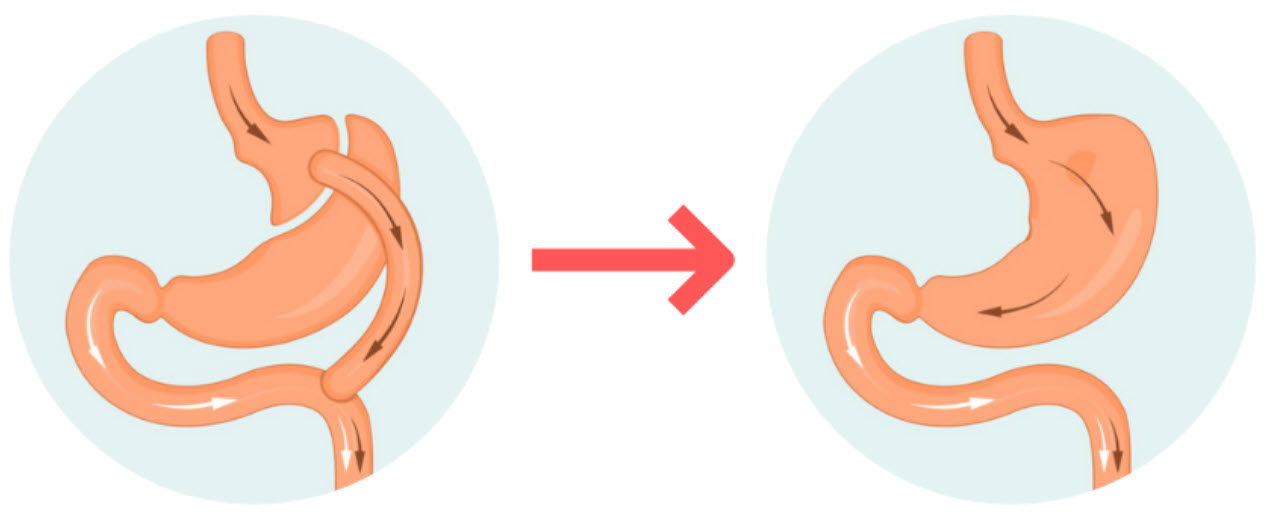Is Mini Gastric Bypass Reversible?
The simple answer is YES. There are many different reasons why someone would want to reverse a mini gastric bypass procedure. If you’re considering a reversal, it is important that you do your research and speak with an experienced surgeon about the risks and benefits. In this article, we will explore more about what a mini gastric bypass procedure entails and how reversals can be done laparoscopically.


What is Mini Gastric Bypass Surgery?
Mini gastric bypass surgery is a laparoscopic procedure that reduces the stomach to about the size of an egg. The goal of the mini-gastric bypass surgery is twofold. It is both restrictive and malabsorptive. As a restrictive surgery, it makes the stomach smaller, which restricts the amount of food able to enter the stomach.
As a malabsorptive surgery, it reduces the absorption of food by bypassing up to 6 feet of the intestines. This surgery works to limit the amount of food a person can eat and absorb, which helps with overall weight loss.
The Surgery: How Is The Reversal Done?
The reversal of laparoscopic procedures such as the mini-gastric bypass is done through small incisions in the abdomen, which allows for a shorter recovery time than traditional open surgeries. In addition, this surgery is reversible because the stomach can be returned to its regular shape when a surgeon removes the stomach staples laparoscopically. After the reversal of this this type of bariatric surgery, the food’s route will vary from patient to patient, so speak to your doctor if you have any concerns before undergoing this procedure.
Why Would I Want to Reverse Mini Gastric Bypass Surgery?
There are many reasons why someone would want to reverse the mini gastric bypass surgery. Some people may find that they are not losing the weight they wanted to or that they are experiencing other health problems after the surgery. Some additional reasons someone would seek out a mini gastric bypass surgery include:
- new food intolerances (such as the inability to eat some solid foods)
- malnutrition
- chronic vomiting, nausea, or severe abdominal pain
- blood sugar problems that cause weakness, sweating, tiredness, or lightheadedness.
- chronic ulcers
The decision to reverse your mini bypass surgery is a very personal one and should be discussed with your surgeon or primary care physician before undergoing this procedure.
Mini Gastric Bypass Vs. Traditional Bypass Surgery
Mini gastric bypass surgery has the same end results as traditional bypass surgery: decrease the overall accessible stomach volume and prevent the patient from overeating. However, the main difference between the two is that mini-gastric bypass has less intestinal rerouting than traditional gastric bypass. Mini-gastric bypass surgery was developed to reduce operating time, simplify the procedure and reduce complications. The mini is also reversible, while traditional gastric bypass surgery is not.
Am I a Good Candidate for Mini Gastric Bypass Reverse Surgery?
Not everyone is a candidate for reversal surgery, and it is important to have realistic expectations about what the surgery can achieve. Your health history, weight, and medical conditions will all be taken into consideration when deciding if you are a good candidate for mini gastric bypass reversal surgery. Learn more here
If you’re considering reversing your mini-gastric bypass surgery, please speak with an experienced bariatric surgeon to learn more about the risks and benefits of this procedure. At VIDA Bariatrics, we offer free consultations with all of our bariatric surgeons so that you can make the best decision for your health.